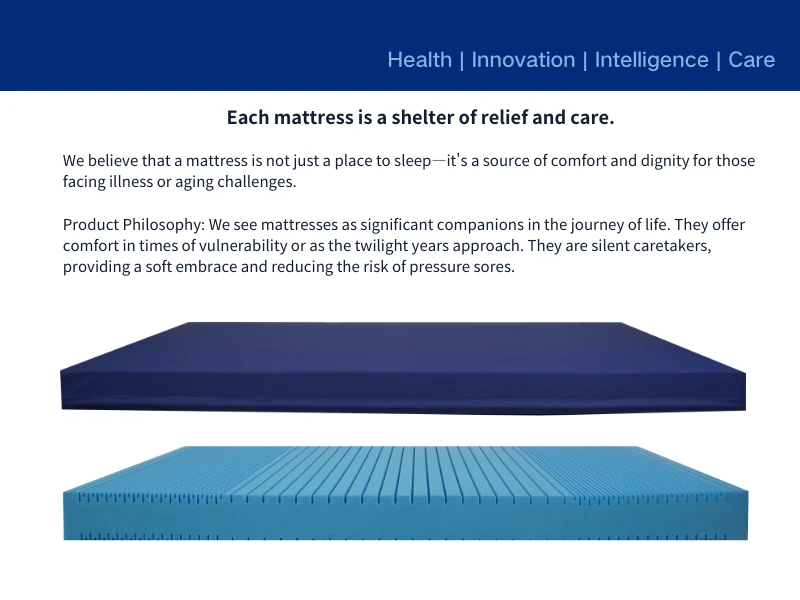medical mattress
Medical mattresses play a crucial role in healthcare settings and have become increasingly popular among consumers seeking enhanced comfort and support for better health. With the growing emphasis on individualized patient care, these mattresses integrate advanced technologies and materials to address specific medical needs, such as pressure ulcers, spinal alignment, and post-surgery recovery.

Modern medical mattresses, unlike traditional ones, are engineered with precision, using layers of advanced foam, gel, and sometimes air pockets to provide targeted support. High-resilience foam, commonly used in these mattresses, not only distributes weight evenly but also conforms closely to the body's unique shape, significantly minimizing the risk of pressure sores. For individuals with mobility challenges, these features are particularly beneficial as they promote blood circulation and reduce the stress placed on joints.
One standout technology in medical mattresses is the inclusion of alternating pressure systems. This cutting-edge mechanism systematically redistributes pressure by alternating the inflation and deflation of air cells within the mattress. This mimics natural movements and helps in enhancing patient comfort while also preventing pressure injuries, crucial for bedridden patients.

In healthcare facilities or at home, where sanitation and hygiene are paramount, medical mattresses often incorporate antibacterial and antifungal covers. These covers are resistant to fluids and easy to clean, providing a hygienic solution for patients with incontinence issues or those at risk of infections. Furthermore, temperature regulation technology integrated into these mattresses ensures that patients remain comfortably cool, preventing heat buildup which can exacerbate discomfort and lead to sweating.
From a professional standpoint, healthcare providers often recommend medical mattresses post-surgery or for chronic conditions like arthritis due to their ability to maximize recovery and alleviate pain. Neurologists and osteopaths frequently highlight the significance of proper spinal positioning, supported by these mattresses, which can profoundly influence patients' recovery trajectories and overall well-being.
medical mattress
In terms of selection, purchasers should be informed of the various options tailored to specific health conditions. For instance, memory foam mattresses are highly praised for their contouring properties, while gel-infused mattresses offer superior cooling effects, ideal for patients who experience night sweats or live in warmer climates. Adjustable air mattresses, on the other hand, offer customizable firmness levels, which can be a versatile option accommodating fluctuating needs over time.
Trust is a critical factor for manufacturers and retailers in the medical mattress market. The leading brands invest in research and development to continually improve mattress designs, ensuring they meet stringent medical standards. Product certifications from reputable health organizations serve as a testament to the mattress's effectiveness and safety, assuring consumers of their investment's reliability.
Consumers should also consider the durability and warranty of a medical mattress. A reputable product will not only meet therapeutic needs but will also last through years of use without compromising its integrity. Warranties often reflect the manufacturer's confidence in their product and provide peace of mind for users investing in their health.
In conclusion, as trends in healthcare evolve, the demand for specialized medical mattresses rises, reflecting a broader understanding of their benefits in promoting health and recovery. A commitment to quality and innovation in medical mattresses translates to better outcomes for patients, offering a restful foundation upon which health can be rebuilt.
-
the-truth-about-orthopedic-mattresses-for-sore-back-painNewsAug.23,2025
-
space-saving-benefits-of-a-single-mattress-cubeNewsAug.23,2025
-
eco-friendly-advantages-of-a-silicon-mattressNewsAug.23,2025
-
how-to-fix-sagging-in-a-special-mattressNewsAug.23,2025
-
how-ambulance-stretcher-mattresses-reduce-pressure-injuriesNewsAug.23,2025
-
best-cleaning-practices-for-a-hospital-mattress-doubleNewsAug.22,2025
-
Mattresses Designed for Back Pain ReliefNewsAug.08,2025

